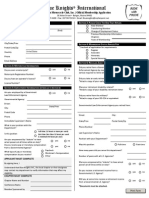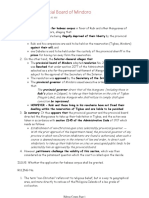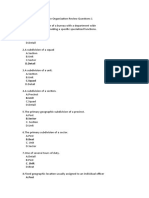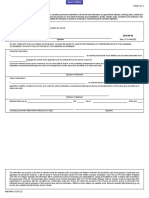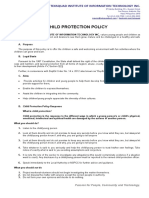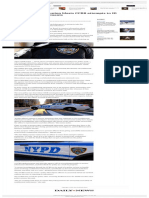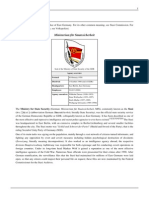Official Public Notice
NOTICE TO AGENT IS NOTICE TO PRINCIPAL
NOTICE TO PRINCIPAL IS NOTICE TO AGENT
U.S. COURT DECISIONS CONFIRM "DRIVING A MOTOR VEHICLE" IS A
CITIZENS RIGHT AND NOT A GOVERNMENT GRANTED PRIVILEGE.
For many years Professionals within the criminal justice System have acted upon the
belief that traveling by motor vehicle upon the roadway was a privilege that was gained
by a citizen only after approval by their respective state government in the form of the
issuance of a permit or license to that Particular individual. Legislators, police officers
and court officials are becoming aware that there are now court decisions that prove the
fallacy of the legal opinion that" driving is a privilege and therefore requires government
approval, i.e. a license". Some of these cases are:
Case # 1 - "Even the legislature has no power to deny to a citizen the right to travel
upon the highway and transport his property in the ordinary course of his business or
pleasure, though this right may be regulated in accordance with the public interest and
convenience. - Chicago Motor Coach v Chicago 169 NE 22
("Regulated" here means traffic safety enforcement, stop lights, signs, etc. NOT a
privilege that requires permission i.e.- licensing, mandatory insurance, vehicie
registration, etc.)
Page 1 of 12
�Case # 2 - "The right of the citizen to travel upon the public highways and to transport
his property thereon, either by carriage or by automobile, is not a mere privilege which a
city may prohibit or permit at will, but a common right which he has under the right to
life, liberty, and the pursuit of happiness."- Thompson v Smith 154 SE 579.
It could not be stated more conclusively that Citizens of the states have a right to travel,
without approval or restriction, (license,) and that this right is protected under the U.S.
Constitution. Here are other court decisions that expound the same facts:
Case # 3 - "The right to travel is a part of the liberty of which the citizen cannot be
deprived without due process of law under the 5th Amendment." - Kent v Dulles, 357
U.S. 116, 125
Case # 4 - "Undoubtedly the right of locomotion, the right to remove from one place to
another according to inclination, is an attribute of personal Liberty, and the right,
ordinarily, of free transit from or through the territory of any State is a right secured by
the l4th Amendment and by other provisions of the Constitution." - Schactman v
Dulles, 96 App D.C. 287, 293.
FUNDAMENTAL RIGHT
As hard as it is for those of us in Law enforcement to believe, there is no room for
speculation in these court decisions. The American citizen does indeed have the
inalienable right to use the roadways unrestricted in any manner as long as they are not
damaging or violating property or rights of another.
Page 2 of 12
�Government, in requiring the people to file for "drivers Licenses, vehicle registrations,
mandatory insurance, and demanding they stop for vehicle inspections, DUI/DWI roadblocks
etc. without question, are "restricting", and therefore violating, the Peoples common law right to
travel.
Is this a new legal interpretation on this subject of the right to travel? Apparently not.
The American Citizens and Lawmen Association in conjunction with The U.S. Federal
Law Research Center are presently involved in studies in several areas involving
questions on constitutional law. One of the many areas under review is the area of
"Citizens right to travel." In an interview a spokesmen stated: "Upon researching this
subject over many months, substantial case law has presented itself that completely
substantiates the position that the "right to travel unrestricted upon the nation’s
highways" is and has always been a fundamental right of every Citizen."
This means that the "beliefs and opinions" our state legislators, the courts, and those of
us involved in the law enforcement profession have acted upon for years have been in
error. Researchers armed with actual facts state that U.S. case law is overwhelming in
determining that - to restrict, in any fashion, the movement of the individual American in
the free exercise of their right to travel upon the roadways, (excluding "commerce"
which the state Legislatures are correct in regulating), is a serious breach of those
freedoms secured by the U.S. Constitution, and most state Constitutions, i.e - it is
Unlawful.
Page 3 of 12
� THE REVELATION THAT THE AMERICAN CITIZEN HAS ALWAYS HAD THE
INALIENABLE RIGHT TO TRAVEL RAISES PROFOUND QUESTIONS TO THOSE
WHO ARE INVOLVED IN MAKING AND ENFORCING STATE LAWS.
The first of such questions may very well be - If the States have been enforcing laws
that are unconstitutional on their face, it would seem that there must be some way that a
state can legally put restrictions, such as - licensing requirements, mandatory
insurance, vehicle registration, vehicle inspections, D.W.I. roadblocks, to name just a
few, on a Citizens constitutionally protected right. Is that not so?
For the answer to this question let us look once again, to the U.S. courts for a
determination on this very issue.
The case of Hertado v. California, 110 U.S. 516. States very plainly: "The State cannot
diminish rights of the people"
"The assertion of federal rights, when plainly and reasonably made, is not to be
defeated under the name of local practice."- Davis v. Wechsler, 263 U.S. 22, 24.
Would we not say that these judicial decisions are straight to the point - that there is no
lawful method for government to put restrictions or Limitations on rights belonging to the
people?
Page 4 of 12
� Other cases are even more straight forward:
"Where rights secured by the Constitution are involved, there can be no rule making or
legislation which would abrogate them."
- Miranda v. Arizona, 384 U.S. 436, 491.
"The claim and exercise of a constitutional right cannot be converted into a crime.· -
Miller v. U.S., 230 F 2d 486, 489.
"There can be no sanction or penalty imposed upon one because of this exercise of
Constitutional rights."- Sherar v. Cullen, 481 F. 945.
( There is no question that a citation/ticket issued by a police officer, for no drivers
license, no current vehicle registration, no vehicle insurance etc. which carries a fine or
jail time, is a penalty or sanction, and is indeed "converting a Right into a crime".)
We could go on, quoting court decision after court decision, however, In addition, the
Constitution itself answers our question- "Can a government legally put restrictions on
the rights of the American people at anytime, for any reason"? (Such as in this particular
case - when the government believes it to be for the safety and welfare of the people).
The answer is found in ARTICLE (6) SIX of the U.S. Constitution:
"This Constitution, and the Laws of the United States which shall be made in Pursuance
thereof; shall be the supreme Law of the Land; and the judges in every State shall be
Page 5 of 12
�bound thereby, any Thing in the Constitution or Laws of any State to the Contrary
notwithstanding".
(This tells us that the U.S. Constitution is to be upheld over any state, county, or
city Laws that are in opposition to it.)
In the same Article it goes on to say just who it is within our governments that are bound
by this Supreme Law:
"The Senators and Representatives before mentioned, and the Members of the several
State Legislatures, and all executive and judicial Officers, both of the United States and
of the several States, shall be bound by Oath or Affirmation, to support this
Constitution;". - ART. 6 Six U.S. CONST.
We know that Police officers are a part of the Executive branch. We are
"Executive Officers".
Article (6) Six above, is called the SUPREMACY CLAUSE, and it clearly states that,
under every circumstance, the above listed officials in these United States must hold
this documents tenets supreme over any other laws, regulations, or orders.
Every U.S. Police officer knows that they have sworn a oath to the people of our nation
that we will not only protect their lives and property, but, that we will uphold, and protect
their freedoms and rights under the Supreme laws of this nation, - the U. S.
Constitution.
Page 6 of 12
�In this regard then, we must agree that those within government that restrict a Citizens
rights, (such as restricting the people’s right to travel,) are acting in violation of his
or her oath of office and are actually committing a crime against such Citizens. Here's
an interesting question. Is ignorance of these laws an excuse for such acts by officials?
If we are to follow the "letter of the law (as we are sworn to do), this places officials that involve
themselves in such unlawful acts in a unfavorable legal situation. For it is a felony and federal
crime to violate, or deprive citizens of their Constitutionally protected rights.
Our system of law dictates the fact that there are only two ways to legally remove a right
belonging to the people. These are - #1 - by lawfully amending the constitution, or
#2 - by a person knowingly waiving a particular right.
Some of the confusion in our present system has arisen because many millions of
people have waived their right to travel "unrestricted" upon the roadways of the states
and opted into the jurisdiction of the state for various reasons. Those who have
knowingly given up these rights are now legally regulated by state law, the proper
courts, and "sworn, constitutionally empowered officers-of-the-law," and must acquire
proper permits, registrations, insurance, etc.
Page 7 of 12
� There are basically two groups of people in this category:
#1 - Any citizen that involves themselves in "commerce," (business for private gain),
upon the highways of the state.
Here is what the courts have said about this:
"...For while a citizen has the right to travel upon the public highways and to transport
his property thereon, that right does not extend to the use of the highways, either in
whole or in part, as a place for private gain. For the latter purpose no person has a
vested right to use the highways of the state, but is a privilege or license which the
legislature may grant or withhold at its discretion..." - State v Johnson, 243 P. 1073,
1078.
Other U.S. court cases that confirm and point out the difference between the "right" of
the citizen to travel and a government "privilege" are - Barney v Board of Railroad
Commissioners; State v City of Spokane, 186 P. 864.; Ex Parte Dickey (Dickey v
Davis), 85 S.E. 781.; Teche Lines v Danforth, 12 So.2d 784.
There are numerous other court decisions that spell out the JURISDICTION issue in
these two distinctly different activities. However, because of space restrictions we will
leave it up to all public officials etc. to research it further for themselves. (See last page
for additional references).
Page 8 of 12
�#2 - The second group of citizens that are legally under the jurisdiction of the state is the
individual citizen who has voluntarily and knowingly waived their right to travel
"unregulated and unrestricted" by requesting placement under such jurisdiction through
the acquisition of a state - drivers license, vehicle registration, mandatory insurance,
etc. (In other words "by contract only".)
We should remember what makes this "legal," and not a violation of the individual’s
common law right to travel "unrestricted" is that they knowingly volunteer, freely, by
contract, to waive their right. If they were forced, coerced or unknowingly placed under
the States powers, the courts have said it is a clear violation of their rights.
This in itself raises a very interesting question. What percentage of the people in each
state have filed, and received, licenses, registrations, insurance etc. after erroneously
being advised by their government that it was mandatory?
Many of our courts, attorneys and police officials are just becoming informed about this
important issue and the difference between "Privileges vs. Rights". We can assume that
the majority of those Americans carrying state licenses, vehicle registrations etc., have
no knowledge of the rights they waived in obeying laws such as these that the U.S.
Constitution clearly states are unlawful, i.e. "laws of no effect". In other words - "LAWS
THAT ARE NOT LAWS AT ALL."
Page 9 of 12
� OUR SWORN DUTY
An area of serious consideration for every police officer, is to understand that the most
important law in our land he has taken an oath to protect, defend, AND ENFORCE, is
not state laws, nor city or county ordinances, but, that law that supersede all other laws
in our nation, - the U.S. Constitution. If laws in a particular police officer's state, or local
community are in conflict with the SUPREME LAW of our nation, there Is no question
that the officer's duty is to "uphold the U.S. Constitution."
What does this mean to the "patrol officer" who will be the only sworn "Executive
Officer" on the scene, when knowledgeable Citizens raise serious objections over
possession of insurance, driver’s licenses and other restrictions? It definitely means
these officers will be faced with a hard decision. (Most certainly if that decision affects
state, city or county revenues, such as the issuing of citations do.)
Example: If a state legislator, judge or a superior tells a police officer to proceed and
enforce a contradictory, (illegal), state law rather than the Supreme Law of this country,
what is that "sworn officer" to do? Although we may not want to hear it, there is but one
right answer, - "the officer is duty bound to uphold his oath of office" and obey the
highest laws of the nation. THIS IS OUR SWORN DUTY AND IT'S THE LAW!
Such a strong honest stand taken by a police officer, upholding his or her oath of office,
takes moral strength of character. It will, without question, "SEPARATE THE MEN
FROM THE BOYS." Such honest and straight forward decisions on behalf of a
Page 10 of 12
�government official have often caused pressure to be applied to force such officers to
set aside, or compromise their morals or convictions.
As a solace for those brave souls in uniform that will stand up for law and justice, even
when it's unpopular or uncomfortable to do so...let me say this. In any legal stand-off
over a sworn official "violating" or "upholding" their oath of office, those that would side
with the "violation" should inevitable lose.
Our Founding Fathers assured us, on many occasions, the following: Defending our
freedoms in the face of people that would for "expedients sake," or behind the guise,
"for the safety and welfare of the masses," ignore people’s rights, would forever demand
sacrifice and vigilance from those that desired to remain free. That sounds a little like -
"Freedom is not free!"
Every police officer should keep the following U.S. court ruling, that was covered earlier, in
mind before issuing citations in regard to "mandatory Licensing, registration and insurance" -
verses - "the right of the people to travel unencumbered":
"THE CLAIM AND EXERCISE OF A CONSTITUTIONAL RlGHT CANNOT BE
CONVERTED INTO A CRIME." - Miller v U.S., 230 F 2d 486. 489.
And as we have seen, "traveling freely," going about ones daily activities, is the exercise of a
most basic right.
Page 11 of 12
�Page 12 of 12






























































